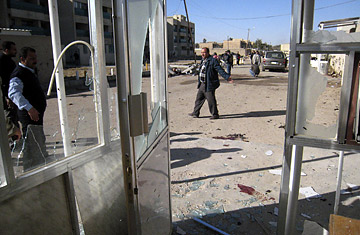
A scene of a suicide bombing in Baghdad, Iraq on Monday Jan. 7, 2008.
The man coming toward Riyadh al-Samarrai, the leader of an armed Sunni faction in Baghdad backed by U.S. forces, moved in as though he were going for a hug. Then the explosives strapped to the bomber's body went off, killing al-Samarrai and at least five others while wounding nearly 30 outside an office building in Baghdad today.
The leader of a band of fighters in the northern Baghdad neighborhood of Adamiya, al-Samarrai was the third prominent member of the so-called Awakening movement to be killed in the past two weeks. And the string of killings have left some in Baghdad wondering whether Osama bin Laden's recent threat to strike down Iraqi fighters working with U.S. forces was more real than his past bluster about the war here.
"They will suffer in life and in the afterlife," bin Laden said in an audio message that surfaced Dec. 29. Roughly 72,000 tribal fighters, virtually all of them Sunni, have denounced al-Qaeda in Iraq and formed a kind of confederation of militias with help from U.S. forces. Bin Laden, in his message, called them betrayers of Islam and said they would pay for their sins. "The most evil of the traitors are those who trade away their religion for the sake of their mortal life," bin Laden said.
How much of a hand bin Laden has in Iraq has long been a hotly debated question. The Bush administration, in making a case for invading Iraq, repeatedly suggested there were links between Saddam Hussein and al=Qaeda, though none were ever proven. Later, insurgent leader Abu Musab al-Zarqawi claimed to be doing bin Laden's bidding in Iraq. But no firm links emerged tying al-Zarqawi's fighters in Iraq to the al-Qaeda network's leadership, which is thought to be hiding in the mountains of Pakistan. Today in Iraq most U.S. commanders believe that certain elements of the insurgency get some financing and direction from foreigners entering Iraq from various points around the Middle East. Whether the outsiders answer to bin Laden is unknown, however.
What does seem increasingly clear is a growing ability by bin Laden to at least inspire grand acts of carnage in Iraq much as his pronouncements appear to do elsewhere in the world. In recent years, bin Laden's messages appear to have stirred attacks and plots by militants who seem to have little connection to the al-Qaeda network beyond a shared ideology. Much the same dynamic looks to be taking shape now among Iraq's Sunni militants, who have kept up attacks in Baghdad and elsewhere in Iraq despite a recent drop in overall violence across the country.
U.S. military officials say bin Laden's rants against tribal fighters now aligned with U.S. forces, also known as "concerned local citizens" by the military, shows how worrisome the anti-al-Qaeda movement is to insurgents who hope to overtake Iraq and turn it into an Islamic state along the lines of one bin Laden envisions. "The level of attacks and the focus that they might have on the concerned local citizens and those who are part of the Awakening movement are perhaps one of the clearest indications of the importance that these Awakening movements and concerned local citizens are having on improving the security situation in Iraq," said Maj. Gen. Kevin Bergner, the U.S. military spokesman in Iraq. "The fact that al-Qaeda is targeting them is clearly an indication that they are concerned about it and that this grassroots movement, if you will, has changed the dynamic."
But Mahmood al-Sumaida, a member of the reconciliation commission for Adhamiya, doesn't get the sense that al-Qaeda in Iraq is on ropes. "They have done this before," al-Sumaida said of al-Samarrai's assassination. "And they will do it again."
